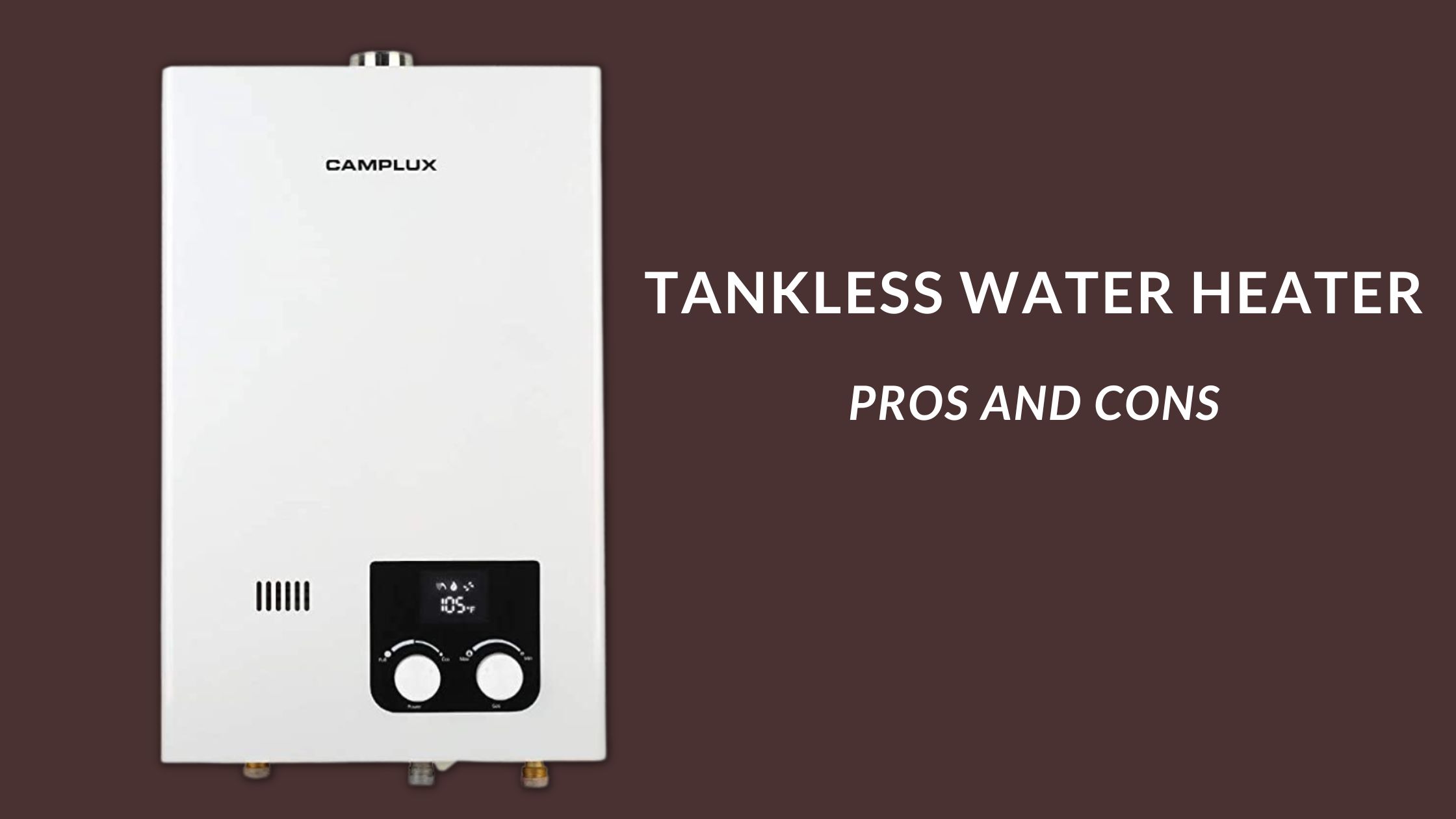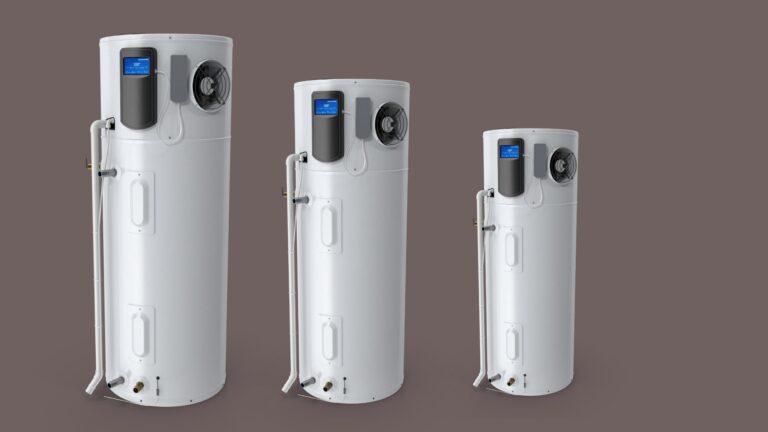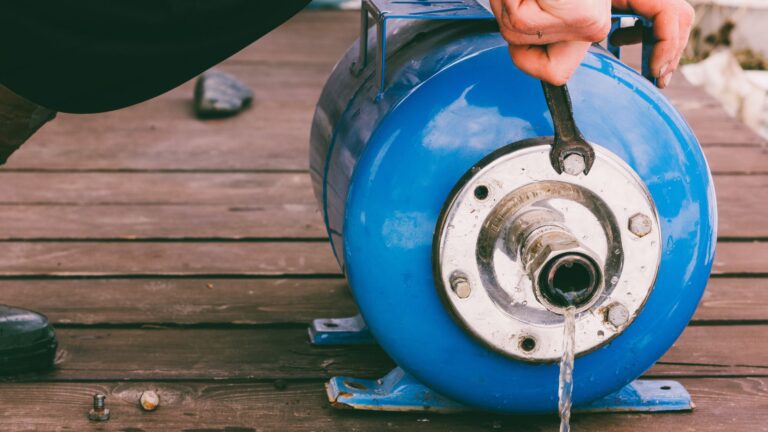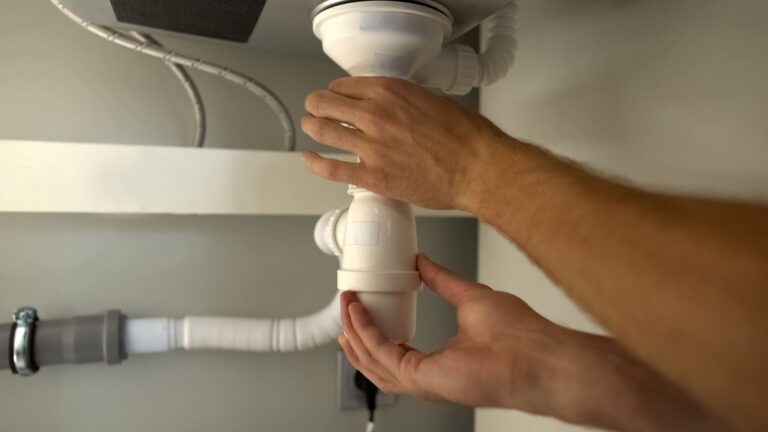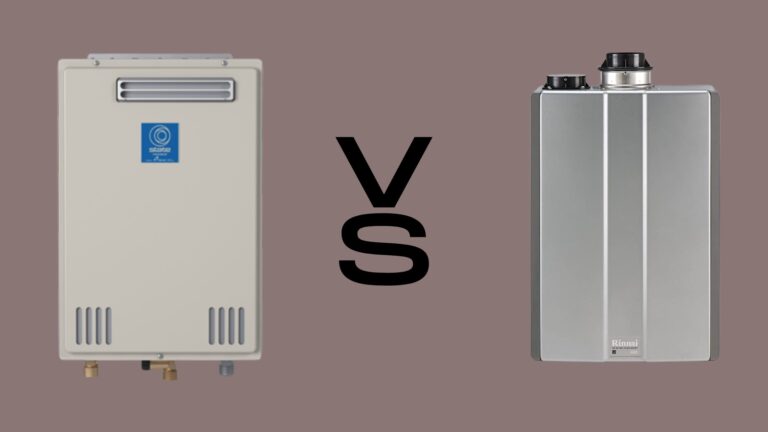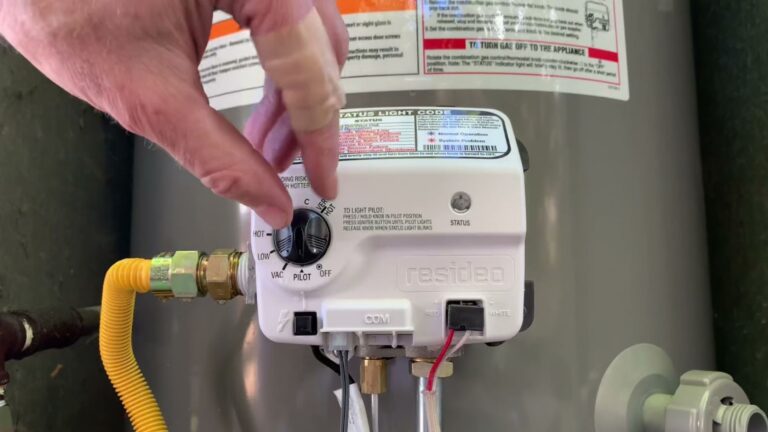Tankless Water Heater Pros And Cons You Should Know
I know how confusing you feel when choosing a water heater. You may have heard about the tons of benefits of a tankless water heater but there are sub-types of a tankless water heater and you’re more confused about which machine offers you what.
If this is your situation now and you need a detailed clarification about tankless water heater pros and cons, this article will help you.
The fact is, a tankless water heater produces an endless water supply, has a lower risk of leaking, takes up less space, has a longer lifespan on average, and is safer. Moreover, it offers cost and energy savings as well.
Let’s dive into the topic and get to know everything about a tankless water heater and hot water heating pros and cons.
What Is A Tankless Water Heater?- How Does It Work?

Let’s get started from scratch- what exactly is a tankless water heater?
If you know what a tank water heater is, think reversely. A tank water heater is a large container that heats and stores the water. But there’s no container in a tankless water heater (as the name sounds). Hence, the water will be heated based on your demand.
Here’s a brief about the working process of a tankless water heater (gas unit):
- Once you turn on a hot water tap, the heather starts being filled with cold water.
- A flow sensor detects the water and starts the healing process.
- The cold water gets hotter by a heat exchanger and you get the water of your desired temperature.
- When the tap is turned off, the water heater turns off automatically.
About an electric tankless water heater, the working process is almost the same as a gas-powered water heater. But hence, an electric-powered burner is used to exchange the heat instead of a flame.
While having a tank water heater, you need to keep a lot of water continuously heated in the tank before. But a tankless heater supplies you with hot water less expensively yet more quickly.
Types of Tankless Water Heaters
Before we delve into the point of hot water heater pros and cons, let’s have an idea about what types of tankless water heaters are available out there. It will help you compare the sub-types of tankless water heaters.
Gas Water Heater

Natural gas or propane is used to heat the water in a gas water heater. Both propane and natural gas are inexpensive. However, the installation of a gas water heater costs higher than an electric one. Also, gas water heaters require more maintenance too.
Electric Water Heater

Electric water heaters are less efficient than gas water heaters. Also, the installation cost for an electric water heater is less than a gas-powered one.
You don’t have to put an electric water heater in a place with existing pipes as it doesn’t require a ventilation system. So, there’s nothing to worry about spaces, electric water heaters are easy to install even in small spaces.
Non-Condensing Water Heater

Non-condensing water heaters are a basic form of gas tankless water heaters.
It’s just, that a non-condensing heater has only one heat exchanger. This heater can vent the steam that cools down outside the unit.
Once the water goes through the heat exchanger, it vents the exhaust outdoors. There are stainless steel pipes in non-condensing heaters that withstand the heat of the exhaust. For this, they require higher installation costs.
Non-condensing water heaters require less upfront cost but the installation cost is higher than other types.
Condensing Water Heater

Unlike non-condensing water heaters, condensing ones do not require expensive fuel pipes and vending materials. It’s because they extract heat from the exhaust and then release it into the venting system.
Hence, the extracted heat is used as another way to heat the water.
However, the upfront purchase cost of condensing water heaters is higher. Still, the installation cost is lower and these heaters have higher energy efficiency. Consequently, this is an inexpensive option for a long period.
Indoor Water Heater

As the name sounds, a water heater that you install inside your home is called an indoor water heater. The biggest advantage of this system is that the heater isn’t exposed to the elements.
So, whenever the climate around your area gets crazier like the temperatures drop below freezing or you face other harsh weather conditions, choosing an indoor water heater would be a wise decision.
However, these heaters need direct airflow via ventilation piping which requires higher installation costs.
Outdoor Water Heater

As you can guess, outdoor water heaters are only a good option for areas with mild weather. Since these heaters ventilate themselves, there’s no need to add ventilation pipes.
If you have an existing horse, you’ll get benefit from an outdoor water heater as you don’t need many adjustments for the plumbing. Also, you don’t have to make changes to your house just for venting.
However, manufacturers design outdoor heaters in such a way that they can withstand rain, wind, snow, and other weather conditions. For this, outdoor heaters need more maintenance compared to indoor types.
Tankless Water Heater Pros and Cons
In the meantime, you’ve gathered almost all the necessary information regarding the basics of tankless water heaters. Now, let’s face the upsides and downsides of a tankless water heater.
Benefits of A Tankless Water Heater
Endless Supply of Hot Water
When it’s about a tank-style water heater, there’s a limitation by the size of the tank. Tankless water heaters break this limitation and supply you with as much water as you need for use at any given time. No storage tank of hot water means there’s no question of it being empty.
Higher Efficiency
Tankless water heaters can be 50% more efficient than traditional water heaters. Since they don’t need to store water like traditional systems, they don’t spend energy endlessly to heat and maintain a water supply.
Energy Savings
Whenever water sits in a tank, it starts losing heat. This means, a tank-style heater continually turns on and off for keeping water warm and ready to go. On the contrary, a tankless water heater heats the water fast and only when it’s needed.
Consequently, tankless water heaters can lower the energy bill.
Moreover, tankless water heaters last longer than traditional ones, so, you get around 20 years to recoup your investment.
Apart from the savings related to energy efficiency and extended longevity, there are other ways of saving. For example, there are special financing and tax breaks. For higher efficiency, tankless water heaters are qualified for federal tax credits.
The credits help offset the installation cost. From the federal government, you can get a 10% tax credit on the overall cost of purchasing and installing a tankless water heater.
Less Possibility of Exposure to Toxic Metals
Tankless water heaters ensure you the safety you need. Since there’s no tank, there’s less chance of having leaks or facing water damage to your home.
Also, tankless heaters work like a boss to control the temperature. For this, you don’t have to worry about getting burned by the water coming out of your faucet. Moreover, there’s no question about any water sitting in the tank for a long period.
In worst cases, a tankless water heater’s tank may deteriorate over time. Eventually, your water might get toxic by the naturally occurring corrosion.
Green Option
The water flow of a tankless water heater not only makes sure that you have fresh and toxin-free skin but also it stays friendlier to the environment.
Traditional water heaters do not heat water efficiently. Let me explain.
When you go on a vacation for quite a long time, your tankless water heater will use very little energy. On the contrary, a traditional heater will use the same amount of energy throughout the period.
Longer Lifespan and Lower Operative Cost
Tankless water heaters have a longer lifespan compared to high-quality tank-style water heaters. Typical water heaters can last as many as 10 years whereas you can expect a tankless water heater to last twice as long.
Another s-tier advantage you can get from a tankless water heater that its lower month-to-month costs. Although the initial cost is higher than traditional water heaters, tankless heaters are 22% more efficient which leads you to save up to $100 annually.
Versatile
Tankless water heaters are found in gas, electric, and solar models. A non-gas tankless heater can save you from the hassle of rerouting gas lines or investing in other labour-intensive, costly alternative options.
And, if you go for a solar water heater, there’s nothing to worry about rerouting gas lines or installing new electrical fixtures. Solar water heaters are suitable for any climate and take less time to make up for the higher price tag.
Drawbacks of A Tankless Water Heater
Temperature Fluctuation
One of the biggest issues you can face while using a tankless water heater is inconsistent water temperature. It happens when you need a hot water supply from multiple sources simultaneously.
So, you’ll find it difficult to use multiple showers, dishwashers, clothing washers, or other appliances at the same time.
Higher Upfront Cost
Although the operating cost of a tankless water heater is low, this product may put a dent in your bank account. The traditional water heaters cost around $500 whereas the least expensive tankless water heaters start at $1000.
However, the specialized models of tankless heaters come with so many great features that the expenditure will be totally worth it.
Power Outage Reliability
When the power goes out, you may not get hot water in an emergency. Although you use a gas tankless water heater, the overall system depends on a control panel that runs on electricity.
Additional Equipment is Often Necessary
Usually a water softener is required to make sure that a tankless water heater operates well. This additional equipment will add to the unit’s upfront price tag. Also, a softener will take up quite a lot of space beside the wall-mounted heater.
Electric Tankless Water Heater Pros And Cons
Using an electric water heater can make your life easier. This type has a bunch of advantages to offer you like lower up-front costs, higher efficiency, safety ensured, and so on. Let’s get a detailed idea about the pros and cons of an electric tankless water heater.
Pros
- Electric tankless water heaters are more efficient compared to gas tankless water heaters. You can expect to get energy efficiency as high as 0.89 EF factor from electric tankless options.
- An electric water heater’s initial cost is significantly less than a gas-powered water heater. There are electric water heaters in the $500-$700 price range but you need to spend at least $1,000 to get a gas tankless water heater.
- It’s easier to install an electric water heater. All you need is a 150 A grid to install it. Also, the installation cost is lower than gas-powered heaters.
- Electric water heaters don’t require high maintenance. You’ll have to clean the inlet screen filter often, that’s it.
- Electric water heaters are safer than gas-powered ones as there’s no risk of a gas leak.
- Electric counterparts are lighter than the counterparts of a gas tankless water heater.
Cons
- Electric water heaters take longer to heat the water. Once you’re done using all the hot water, it will take quite a while for the unit to heat up the rest of the water.
- Although the upfront cost of an electric water heater is lower, the operating cost is higher than gas water heaters.
Gas or Electric Water Heater?- Which One Should You Go For?
The answer solely depends on which you prefer over what. Take a quick look at the comparison chart to get a crystal clear idea about their specifications.
| Parameters | Electric Tankless Water Heaters | Gas Tankless Water Heaters |
| Overall cost-efficiency | Less | More |
| Energy efficiency | 0.89 EF Factor | 0.80 EF Factor |
| Installation cost | $400-$1,000 | $500-$1,000 |
| Unit cost | $500-$900 | $1,000-$2,200 |
| Flow rate capacity | Around 10 GPM | 8 GPM- 20 GPM |
| Environmental effect | Lower | Higher |
If you see around, you’ll notice that more people are deciding for an electric water heater than a gas-powered model. It’s because electric water heaters are mode affordable, easier to install, without the risk of gas leakage, and run on electricity.
Be very careful about the power supply grid when you choose an electric tankless water heater. The amperage of electric supply must be up to 200 A which is quite high. So, if your home is equipped with an older electric grid, you need to upgrade it to handle the enhanced amperage.
Gas Tankless Water Heater Pros And Cons
There are two options gas tankless water heaters are run by; natural gas or propane.
Also, you’ll find some models that come with both gas and propane options. If you prefer a budget-friendly option, a natural gas-powered water heater would be better.
Since not all households have natural gas access, make sure your household has the accessibility before buying a gas tankless water heater.
Now, let’s check what pros and cons you can get from this type of water heater.
Pros
- Gas water heaters are usually less expensive to run because gas is cheaper than electricity. However, it varies from area to area. Because there are places where gas costs are higher due to the lack of supply in the region.
- These water heaters are twice as fast at heating water than electric options. If an electric heater takes one hour to heat 100L of water, a gas heater can heat 200L within the duration.
- Some gas water heaters do not lose hot water while there’s a power outage. One type of gas heater ignites with electric ignition and they can’t work during blackouts. But if your gas heater ignites with a pilot light rather than using an electric ignition, it’ll work during blackouts.
- There is a wide range of sizes available when it comes to gas tankless water heaters.
Cons
- Both the upfront cost and installation cost for a gas tankless water heater is higher than an electric model. The total cost for an electric heater (40-gallon capacity) ranges between $1,000-$1,700 whereas the cost for a gas heater is between $1,400-2,800.
- Gas tankless water heaters require more maintenance than electric options. You need to hire a trained technician to inspect a gas water heater annually and make sure that the fuel combustion and performance are safe enough.
- Gas water heaters are less eco-friendly than electric heaters. Natural gas is retrieved from the earth in a destructive process that releases a high amount of greenhouse gasses into the environment.
- These heaters have a shorter shelflife compared to electric water heaters. Also, it’s more difficult to install a gas water heater than an electric model. Because gas heaters require an additional ventilation system that also requires occasional maintenance.
Indoor vs Outdoor Tankless Water Heater- Which One to Choose?
Which one to choose between indoor and outdoor tankless water heaters is up to your preference. Here’s a set of information you might have a quick look at.
| Factors | Indoor Installation | Outdoor Installation |
| Best for Cold or Windy Climate | Yes | No |
| Best for New Home Construction | Yes | No |
| Spend Less for Unit | Yes | No |
| Risk of Power Outage | No | Yes |
| Poor Interior Drainage | Yes | No |
| Limited Space | Yes | No |
| Gain a Quiet Home | No | Yes |
| Vandalism Concerns | No | Yes |
An indoor water heater works better in colder climates and it adds the value of new construction but it’s noisy and requires venting. On the contrary, the installation of outdoor water heaters is easier and you need to spend less to buy an outdoor model.
However, don’t jump to a conclusion without knowing the full story. Here’s a pro-con list of both water heaters so you can make the right decision.
Benefits of An Indoor Water Heater
- Best for Cold Climates
As you already know, an indoor water heater is installed inside your house, it’s safe from weather conditions like below-freezing temperatures, strong winds, or ocean spray. There’s zero risk of freezing damage to its units.
At the most, you may need to wrap or insulate the exterior of the plumbing. You’re free from further maintenance to keep your heater protected.
ALSO READ: Water Heater Leaking from Cold Water Inlet
- It Rises Up the Resale Value of A New Construction
It’s best to plan for an indoor heater from the very first days of building a new home.
It’s specifically more important for a gas water heater. You can select exactly the perfect spot and build the proper ventilation from day one. As a tankless gas heater has a lot of benefits (like zero risk of weather damage, and lower energy costs), these will rise up the value of your home.
Drawbacks of An Indoor Water Heater
- Chances of Carbon Monoxide Poisoning (Gas Water Heater)
This will never be an issue if you purchase an electric water heater. Nevertheless, indoor gas water heaters must have venting to keep poisonous gases from your home.
The results of carbon monoxide poisoning are chest pain, weakness, vomiting, headache, upset stomach, and dizziness.
However, if you can ensure that your house has adequate venting, the problems will not show up. Eventually, you have to spend more on the installation as the process is pretty expensive.
- Indoor Gas Water Heaters Require Annual Maintenance
For safety concerns, you must hire a licensed HVAC professional for checking the heater’s integrity each year.
You need to be sure that the heater is combusting properly and that there are no cracks or leaks in the pipes. If you don’t accept the hassle, your family will be in danger of carbon monoxide poisoning.
- Risk of Leaks and Condensation
While heating the water, a gas tankless water heater creates a huge amount of condensation. You must ensure sufficient drainage for preventing water damage to the interior of your home. For this, you have to install a condensate drain plus route it to a utility sink or a drain on the floor.
- Quite Noisy
Indoor tankless water heaters make noise no matter if it’s a gas or electric water heater. But the problem is bigger when you have a gas water heater. So, if you are a light sleeper or allergic to such noise, think twice before buying an indoor heater.
Benefits of An Outdoor Water Heater
- Easier to Install- Even If It’s a Gas Heater
Gas tankless water heaters are an ideal option for outdoor installation. And guess what? You don’t have to change your home’s structure to install it. Also, there’s nothing to worry about condensation as an outdoor gas heater’s venting is much shorter.
Eventually, a drainage system isn’t a must in this case. It’s a great thing for homes that lack good drainage. Also, the overall installation process is cheaper and faster as well.
- Ideal for Warmer Climates
If you’re from a warm living area, you can taste the sweet fruits of an outdoor water heater since there’s no worry about weather conditions.
Outdoor tankless water heaters are always quicker and more efficient. But areas of cold climates are not the right habitat for an outdoor heater as the parts of this appliance can be damaged by weather conditions.
- More Durable Option
Outdoor tankless water heaters are designed with extraordinary weatherproofing features. These heaters can withstand harsh wind, snow, extreme heat and other weather conditions. Some models come with aluminium enclosures that make them rustproof.
Drawbacks of Outdoor Water Heaters
- Weatherproofing Is Required
Although outdoor water heaters are designed with durable elements, there’s always a risk of damage. You have to ensure freeze protection for the heat exchange when the heater is exposed to cold temperatures.
And, another matter of hassle is that freeze protection systems require a different power source than the heater itself. It causes additional energy costs for the heater. As you can guess, the money saved on installation costs will end up being spent on weatherproofing costs.
- Risk of Vandalism and Theft
In case, you don’t have any form of home security, you’ll be worrying about the heater being theft. The copper that’s used to manufacture the heaters are gold to thieves. There’s no such risk if you go for an indoor water heater.
- Outdoor Heaters May Break In a Power Outage
There’s no guarantee that you won’t suffer a power outage during cold weather. If you’re from an area where power outage is common, an outdoor heater shouldn’t be your option. Also, your heater can be irreparably damaged if you lose the freeze protection.
Sizing Idea of A Tankless Water Heater
You never want to purchase a water heater that’s too small to satisfy your hot water needs or too big that needlessly wastes energy, right? From that point, you may ask, what size tankless water heater do I need?
The answer depends on some factors like your maximum hot water needs and how much water per minute a heater heats up and so on.
ALSO READ: How To Clean Hot Water With Vinegar
However, we’re showing you a rough idea about how big a unit you should buy for a family. As you can guess, a family of 5 will need a bigger tankless water heater than a family of 3.
Let’s see what GPM (Gallons Per Minute) numbers are needed for a gas tankless water heater and what KW numbers are required for electric heaters for different families.
| The number of Family Members | Electric Tankless Heater Size (KW) | Gas Tankless Heater Size (GPM) |
| Family of 2 | 10-18 KW | 6-8 GPM |
| Family of 3 | 15-23 KW | 7-9 GPM |
| Family of 4 | 20-28 KW | 8-10 GPM |
| Family of 5 | 25-34 KW | 9-11 GPM |
| Family of 6 | 34+ KW | 11+ GPM |
How to Save Money on A Tankless Water Heating Bill
Since a huge portion of the energy use goes towards heating water, you have to spend a lot if you don’t make a plan. Here’s what you can do for saving money on a tankless water heating bill.
Don’t Use Hot Water for Laundry
Although it doesn’t seem so much, using cold water for laundry will save you around $161 per year with an electric heater and $67 per year with a gas heater. Since most detergents do not require hot water to work effectively, you can reduce your monthly utility bill.
Install Low-Flow Shower Fixtures
Investing in low-flow shower fixtures will reduce your monthly utility bill. How? Well, such fixtures can reduce the amount of hot water you use and eventually save you around 25-60% water.
Keep The Heater Temperature at 120℉
It’s possible to save 3-5% on your monthly water heating costs with each 10℉ reduction in the water temperature. Also, this will help families with children to adjust the temperature and avoid injuries from scorching hot water.
Frequently Asked Questions
Q: Do tankless water heaters increase electric bills?
Answer: Yes and no. Since a tankless water heater heats up your hot based on your demand, they generate heat a few times a day which required electricity. However, a tankless water heater uses less energy and is more efficient compared to traditional water heaters.
In comparison to a conventional water heater, you can expect a tankless water heater to save up to $107 annually. If you use less than 41 gallons of hot water per day, a tankless water heater can be 24%-34% energy efficient which eventually reduces your electric bills.
Q: What is the cheapest way to heat water?
Answer:Tankless water heaters are more fuel-efficient than tank-type models.
So, you can save money just by moving into a tankless water heater from a tank-style one. If you want a more specific answer, a gas-powered water heater would be the cheapest option. Even heaters that are run by natural gas are less expensive than propane-powered heaters.
Q: Is a tankless water heater enough for the whole house?
Answer:Yes. Regardless of whether it’s a gas or electric tankless water heater, it can perform with high efficiency and meet the whole-house hot water needs. In fact, a whole-house tankless water heater is the best option to get a continuous supply of hot water any time you need it.
Final Words
And, that was all about tankless water heater pros and cons. We believe that you’ve got a clear idea about anything you would’ve asked about a tankless water heater. No matter which type of water heater you buy, make sure you use and maintain it properly to get a long journey with the machine. Good luck!
ALSO READ:
7 Best Tankless Water Heater for RV
How to Clean Sediment from Water Lines

